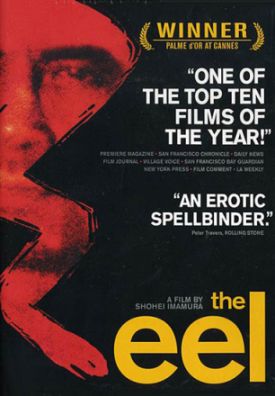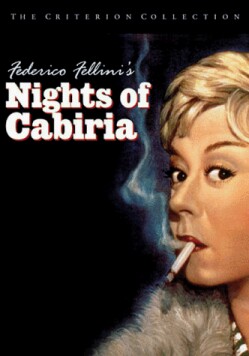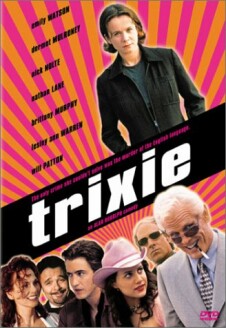Eel, The
The Eel, directed by Shohei Imamura, is like so many Japanese films a visual feast which works less well as a naturalistic drama than as a sort of moral parable, shot through with significant symbolism in mostly beautiful pictures. The story is of a midlevel Japanese “salaryman” called Yamashita (Koji Yakusho, who made such an impression last year in Shall We Dance?) whose hobby is night fishing. When he goes out on luminous Japanese nights, his beautiful young wife packs him a box lunch. One day he gets an anonymous letter telling him that his wife is meeting a lover when he is out night-fishing. His suspicions aroused, he sneaks home in the middle of the night (having given his box lunch to another fisherman) and finds them confirmed. Calmly he takes a butcher knife from the kitchen and stabs both his wife and her lover, then bicycles to the local police station, his fisherman’s yellow anorak and cap covered in blood, to turn himself in for their murders.
All this, including the wrenching scene of his wife’s death in which arterial blood appears repeatedly to spray the camera lens, takes place over the opening credits. The film proper begins with Yamashita’s release on parole eight years later, carrying with him a pet eel in a plastic bag. Early on, the eel is established as a symbol of Yamashita’s now cauterized psychic wound. The eel, he explains to his parole officer and friend, a Shinto clergyman and calligrapher called Nakajima (Fujio Tsuneta), “listens to what I say” and “doesn’t say what I don’t want to hear.” And, indeed, its characteristic gulping motions look like silent speech. Later, when Yamashita opens a small barber shop to practise the trade he has learned in prison, he meets another damaged character, Masaki (Ken Kobayashi), who keeps up a comic UFO watch and dreams of aliens because he is afraid of people. He and Yamashita both seem to acknowledge the similarity between them.
Into Yamashita’s now tranquil life there drifts a young woman called Keiko (Misa Shimizu) who looks disturbingly like his late wife. He finds her on one of his fishing trips just after she has taken an overdose of pills and saves her life. Coming to thank him, she explains that she “fell in love with the wrong man” and that she is terribly sorry for all the trouble she has caused him. Like him, however, she soon sees the healing potential of the rural barber shop with its complement of colorful local characters and insists on coming to work for him. Yamashita reluctantly consents, warning that “I’ve had my fill of women” and insisting on keeping things on a strictly professional level between them. But they gradually fall into a mutual dependence and affection that is almost indistinguishable from love. The necessarily evocative symbol of this affection (though of course it is unknown to her as such) are the box lunches that she obstinately prepares for his fishing trips and that he obstinately refuses.
You can guess where this is going. Unfortunately, in getting there we have to pass through a bit of melodrama involving a drunken fellow ex-con who threatens to expose Yamashita’s shameful past and another involving Keiko’s married boyfriend, the one she tried to kill herself over, and his plot to swindle her crazy mother out of her life savings. I found all this stuff to be an unnecessary distraction and a disruption of the otherwise hypnotic images of natural beauty in whose context the tale of redemption and psychic repair was unfolding. It does make a small contribution, however, to the cumbrous process by which we are got to the point of the eel’s secondary symbolism, since the male eel is said to sacrifice itself for baby eels which it has not sired.
I can’t help feeling that this is rather a lot of moral weight to be dumped on a poor, shoulderless eel, and I didn’t much care either for perky Keiko’s words of encouragement to Masaki, still wondering if the UFOs will ever come, which are offered to us as a hopeful valedictory at the end. “If you put your heart into it, I’m sure they will,” she says. In fact, they won’t. But Imamura, with the symbolist’s fine disregard for mere fact, presumably thinks that such heartiness will be its own reward, even though one’s experience with self-deception scarcely emboldens one to think so.
Discover more from James Bowman
Subscribe to get the latest posts to your email.








